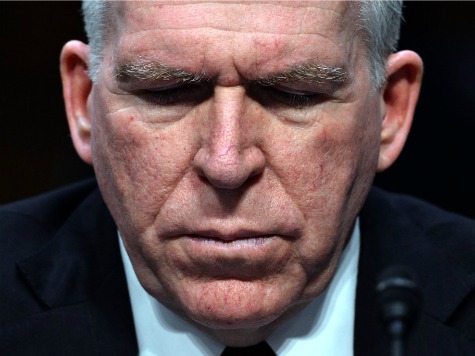Two Democratic senators, Mark Udall (D-CO) and Martin Heinrich (D-NM), have called on CIA Director John Brennan to resign after he admitted that the CIA had spied on Senate computers used by Senate staffers to research a report on the agency’s interrogation and detention practices during the Bush administration. Brennan apparently called Sen. Diane Feinstein (D-CA), Chairman of the Senate Intelligence Committee, to apologize. Despite this admission, however, neither President Obama nor Feinstein has called for Brennan’s resignation and the likelihood is the president won’t.
Why? Because Brennan wasn’t asked to resign for a major intelligence breach that was far worse than anything that happened with the Senate’s computers. As we explain in our new book, Obama’s Enforcer: Eric Holder’s Justice Department, despite White House denials, John Brennan was apparently responsible for the outing of a Saudi Arabian intelligence agent inside the Yemen branch of Al Qaeda.
On May 7, 2012, the Associated Press reported on a CIA counterterrorism operation that had intercepted a plot by the al Qaeda affiliate in Yemen to bomb a U.S. airliner using a more advanced version of the bomb that failed to explode over Detroit on Christmas Day 2009. The bombing was intended to coincide with the one-year anniversary of the killing of Osama bin Laden.
Unfortunately, it was also disclosed that the CIA had been able to stop the plot because of information from a double agent inside al Qaeda, who had to be rushed to safety. Eric Holder called it “if not the most serious, it is within the top two or three most serious leaks that I have ever seen.”
The Justice Department ended up violating its own regulations and federal law when it secretly seized–and failed to notify the AP–telephone records for a two-month period for 20 separate AP phone numbers, as well as the cellular, work and home telephone numbers of individual reporters. Fifty news organizations signed a letter protesting the Justice Department’s actions.
In late 2013, an FBI contractor pleaded guilty to disclosing to the AP that the U.S. had foiled the al-Qaeda bombing plot, although his leak was prompted by the false claims made by the White House that “there was no credible terror threat on the anniversary of bin Laden’s death.”
But the FBI contractor wasn’t responsible for the worst part of the Yemen plot leak. The most damaging information, that there was a Saudi undercover agent who had infiltrated the Yemen al Qaeda affiliate, was actually disclosed by John Brennan, who at the time was President Obama’s advisor for Homeland Security and Counterterrorism. The original AP story said nothing about the government having a double agent inside Al Qaeda.
According to Reuters, on May 7 after the AP story broke and just before the network evening news casts, Brennan “held a small, private teleconference to brief former counter-terrorism advisers who have become frequent commentators on TV news shows.” Brennan told the advisors, including former Clinton official Richard Clarke, that the Yemen plot was never a real threat because Washington had “inside control” over it.
Just after the conference ended, Clark told ABC’s World News Tonight that the bombing plot “never came close because they had insider information, insider control.” A few hours later on ABC’s Nightline, Clark surmised that since the government was saying the plot “never came close because they had insider information, insider control,” that implied “that they had somebody on the inside who wasn’t going to let it happen.” It was Clark’s revelation gotten directly from Brennan that led to headlines the next day that the U.S. had a spy inside the plot.
Despite Brennan’s direct responsibility for the Yemen leak, “unnamed White House officials vehemently denied” to Steven Nelson at US News & World Report that Brennan improperly disclosed classified information.
So once again, as we outline extensively in our book on how the Holder Justice Department has handled national security issues, the administration went after a low-level FBI contractor who leaked information to counter a misleading story put out by the Obama administration. But it ignored the leak of the most damaging information about the Yemen plot by a political appointee of President Obama, John Brennan, who leaked that information specifically to shape the media spin about the efficacy of the administration’s fight against terrorism.
Not only was Brennan never prosecuted for this leak that blew the cover of a key intelligence agent who had worked his way inside al Qaeda, but he was actually rewarded: President Obama nominated him to head the Central Intelligence Agency, where he was sworn in on March 8, 2013.
So despite the anger of members of the Senate over Brennan’s latest admission, including members of the president’s own party, the chances of President Obama asking for Brennan’s resignation are pretty slim–unless the president decides Brennan represents a political liability. As the AP leak fiasco shows, endangering America’s national security was not considered a liability by President Obama when he was looking for his new head of the CIA.
Hans A. von Spakovsky is former Justice Department official and contributor at NATIONAL REVIEW ONLINE. John Fund is the national affairs correspondent at NATIONAL REVIEW ONLINE. They are the coauthors of “Obama’s Enforcer: Eric Holder’s Justice Department” (HarperCollins/Broadside 2014).


COMMENTS
Please let us know if you're having issues with commenting.